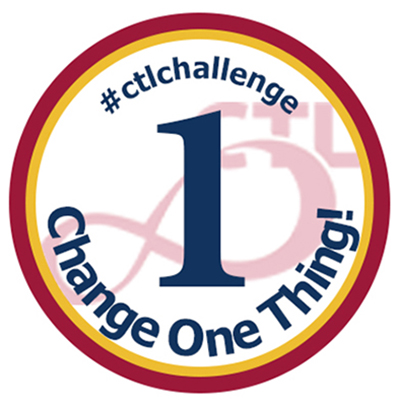Change One Thing to make a difference
December 3, 2019
Share
When Queen’s faculty members attend one of the many workshops offered by the Centre for Teaching and Learning, they are introduced to new ideas and methods for improving the teaching and learning environment at Queen’s.
![[Sue Fostaty Young sits behind her laptop at the Centre for Teaching and Learning]](/gazette/sites/gazettewww/files/assets/WEB%20SueFY_Change%201%20Thing.jpg)
For some participants, says Sue Fostaty Young, Director, Centre for Teaching and Learning, the result can be information overload. And that can interfere with what should be a positive experience.
“We have heard consistently from people how excited they are after they leave our workshops because they are learning so many new and different ways of teaching and making things more exciting for both themselves and their students,” Dr. Fostaty Young says. “But then they can become overwhelmed thinking they have to do everything that they have heard about. The result, sometimes, is that they might not do anything. ”
In response,the Centre for Teaching and Learning is launching the Change One Thing challenge.
At the end of a workshop or a consultation, participants are invited to consider one thing they can commit to change in their teaching practice.
Change, Dr. Fostaty-Young points out, doesn’t have to be overwhelming. It can be incremental.
“Something like this gives people license to be thoughtful about their teaching in a meaningful way, and do it one step at a time,” she says. “I think doing something like this means that people will really be thoughtful about it. They will have a look and say ‘Okay, if I am going to change one thing what’s the important thing that I change?’ and if they ask themselves that question every time they teach, they will have transformed their teaching in some way.”
Once they have implemented this change into their teaching practice, they might eventually consider another new idea or method, and so on.
“Where we would really like to get to, I think, is building a culture of change so that teaching becomes a continuous and evolutionary process,” Dr. Fostaty Young adds. “This type of renewal will have a positive impact on the quality of courses, eventually influencing program improvement. It’s a preliminary step in an incremental process.”
 As part of the Change ONE Thing program, stickers (complete with the hashtag #ctlchallenge) are distributed to participants at CTL events. Meant as reminders of the power of incremental change, the stickers serve as conversation-starters – a way of inviting others to think about what small change they might make to their own teaching that might make a small but positive difference. Dr. Fostaty Young, who keeps her sticker on the cover of her laptop, encourages the Queen’s teaching community to share the changes they’re making through social media.
As part of the Change ONE Thing program, stickers (complete with the hashtag #ctlchallenge) are distributed to participants at CTL events. Meant as reminders of the power of incremental change, the stickers serve as conversation-starters – a way of inviting others to think about what small change they might make to their own teaching that might make a small but positive difference. Dr. Fostaty Young, who keeps her sticker on the cover of her laptop, encourages the Queen’s teaching community to share the changes they’re making through social media.
The changes don’t have to be big. For example, one instructor committed to include two Indigenous resources on their onQ page. This might seem like a small thing, but it’s a step toward decolonizing their course. Another instructor will introduce a 10-minute active learning episode into what was once a 90-minute lecture. That will change the focus of the class from teaching to learning.
Small changes, but they will have a ripple effect, Dr. Fostaty Young says, and pave the way toward developing transformative learning experiences.
To learn more about the Change One Thing challenge, visit the Centre for Teaching and Learning website.